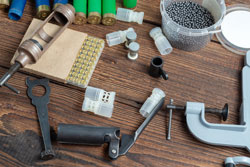 There’s not that much information to read online about carbide reloading dies vs regular dies. That’s why we have prepared for you here a guide just for that.
There’s not that much information to read online about carbide reloading dies vs regular dies. That’s why we have prepared for you here a guide just for that.
There are lots of questions about this topic: do you need case lubes for carbide dies? Do the reloading dies you get online wear out?
Such questions will reveal their answers at the end of this article. This will help you be better informed on hopefully buying the right type of dies for your hunting or shooting needs.
Let’s start!
What are Dies?
Dies are the mechanism in a firearm that deprime the brass and resize them within a set of specifications to crimp the bullet. They’re actually just a hunk of metal that press the empty cartridge back to their normal, standard dimensions every after a fired shot.
What are Carbide Reloading Dies?
Carbide reloading dies are the type of dies to use that are made for longevity and increased level of resistance to scratch.
Unlike a regular type of die, the carbide variety will give you a lifespan of about 750,000 life cycles, depending on brass cleanliness.
What are Regular Dies?
Regular dies are the standard sizing dies that pistols use that have advantages that may not necessarily be useful to beginners. Most experts would suggest that regular dies today no longer have a room for our age, since carbide types are more than enough.
However, they’re at a fraction of the cost of carbide steel dies, so that’s a good advantage of regular steel dies.
Pros and Cons of Carbide Dies
The best advantage you enjoy from a carbide die is that it runs efficiently even without the help of a lube. Here are more of its pros and cons:
- Doesn’t require lube, though it makes for good sizing
- These carbide dies easily resize cases smoothly all day with no problems
- Ideal for straight-walled handgun cartridges
- Can be expensive
- May be a waste of money for some instances, such as when you’re using a 357 sig
Pros and Cons of Regular Dies
The biggest advantage for regular dies is that they’re affordable, while its major con is that it requires much lubing, and if you forget to do that, you risk damaging your firearm.
Here are more of its pros and cons:
- Affordable
- Simpler to use, no need to fiddle around some adjustments
- If you forget to lube them for just once, they start to sort of rust up towards the inside of the firearm, scratching the insides of the gun, causing damage
- Not as fast in reloading as a carbide type
- Needs a lot more lubing
Conclusion
So there you have it: a complete comparison between a carbide reloading die vs a regular die.